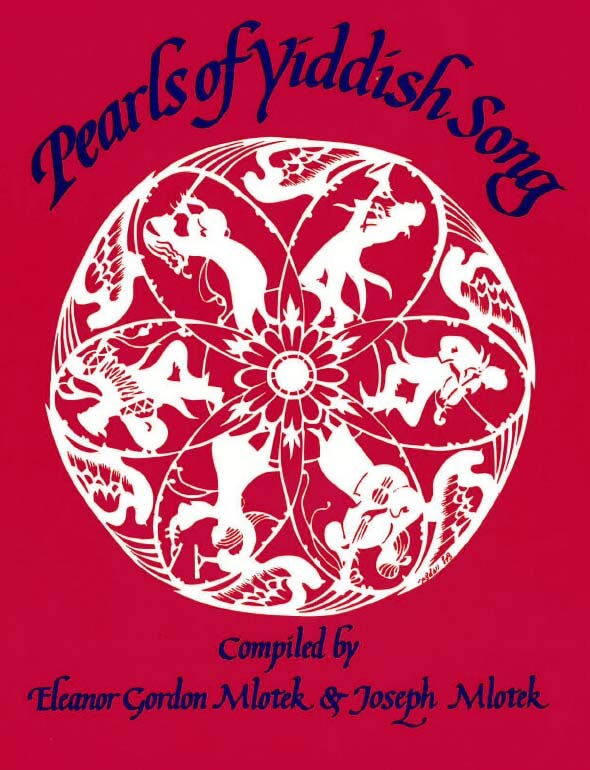Originally entitled “Folksmotiv” (Folk motif). Words by Yehoash, pen name of Solomon Bloomgarten (1872-1927); music by Mikhl Gelbart (1889-1962), published in the composer’s collection Concert in 1933.

Mother mine, mother my heart,
untie the necklace from my throat;
The emperor is traveling here,
and, heaven forbid, if I should please him.
Daughter mine, golden daughter,
do not torment your heart;
I don’t want the emperor to like you,
and you will not wear any jewelry.
Mother mine, mother my heart,
comb my braid so it’s ugly,
The emperor is traveling here,
and send messengers to take me.
Daughter mine, golden daughter,
he won’t send any messengers;
I don’t want the emperor to like you,
and I’ll braid you a tangled knot.
Mother mine, mother my heart,
smear my white face;
The emperor is traveling here,
and will take me to his palace.
Daughter mine, golden daughter,
do not have any fear in your heart;
I don’t want the emperor to like you,
I will blacken you with soot.
Mother mine, mother my heart,
I am shedding bitter tears;
The emperor is traveling here,
how can I lock up my eyes?
Daughter mine, golden daughter,
run away like an arrow from its bow;
I am afraid the emperor will like you,
when he sees your eyes.
— Mamenyu mayne, mamenyu harts,
Bind op fun mayn haldz di kareln;
Der keyser vet kumen tsu forn aher
Un ikh vel im kholile gefeln.
— Tokhterl mayne, tokhterl gold,
Dayn hertsele zol dir nit plogn;
Ikh vil nit der keyser zol hobn dikh holt,
Un du vest keyn tsirung nit trogn.
— Mamenyu mayne, mamenyu harts,
Mayn tsop tu mir mies farkemen,
Der keyser vet kumen tsu forn aher,
Un shikn shtafetn mikh nemen.
— Tokhterl mayne, tokhterl gold,
Er vet keyn shtafetn nit shikn;
lkh vil nit der keyser zol hobn dikh holt,
Un flekht dir a koltn, a dikn.
— Mamenyu mayne, mamenyu harts,
Mayn vays ponim tu mir farshmirn;
Der keyser vet kumen tsu forn aher,
Un vet in zayn palats mikh firn.
— Tokhterl mayne, tokhterl gold,
Hob nit keyn moyre in hartsn;
Ikh vil nit der keyser zol hobn dikh holt,
Ikh vel dikh mit sazhe farshvartsn.
— Mamenyu mayne, mamenyu harts,
Kh’tu bitere trern fargisn;
Der keyser vet kumen tsu forn aher,
Vi ken ikh di oygn farshlisn?
— Tokhterl mayne, tokhterl gold,
Antloyf vi a fayl funem boygn;
Kh’hob moyre der keyser vet krign dikh holt,
Ven er vet derzen dayne oygn.
— מאַמעניו מײַנע, מאַמעניו האַרץ,
בינד אָפּ פֿון מײַן האַלדז די קאַרעלן;
דער קיסר װעט קומען צו פֿאָרן אַהער
און איך װעל אים חלילה געפֿעלן.
— טאָכטערל מײַנע, טאָכטערל גאָלד,
דײַן הערצעלע זאָל דיר ניט פּלאָגן;
איך װיל ניט דער קיסר זאָל האָבן דיך האָלט,
און דו װעסט קײן צירונג ניט טראָגן.
— מאַמעניו מײַנע, מאַמעניו האַרץ,
מײַן צאָפּ טו מיר מיאוס פֿאַרקעמען,
דער קיסר װעט קומען צו פֿאָרן אַהער,
און שיקן שטאַפֿעטן מיך נעמען.
— טאָכטערל מײַנע, טאָכטערל גאָלד,
ער װעט קײן שטאַפֿעטן ניט שיקן;
איך װיל ניט דער קיסר זאָל האָבן דיך האָלט,
און פֿלעכט דיר אַ קאָלטן, אַ דיקן.
— מאַמעניו מײַנע, מאַמעניו האַרץ,
מײַן װײַס פּנים טו מיר פֿאַרשמירן;
דער קיסר װעט קומען צו פֿאָרן אַהער,
און װעט אין זײַן פּאַלאַץ מיך פֿירן.
— טאָכטערל מײַנע, טאָכטערל גאָלד,
האָב ניט קײן מורא אין האַרצן;
איך װיל ניט דער קיסר זאָל האָבן דיך האָלט,
איך װעל דיך מיט סאַזשע פֿאַרשװאַרצן.
— מאַמעניו מײַנע, מאַמעניו האַרץ,
כ’טו ביטערע טרערן פֿאַרגיסן;
דער קיסר װעט קומען צו פֿאָרן אַהער,
װי קען איך די אױגן פֿאַרשליסן?
— טאָכטערל מײַנע, טאָכטערל גאָלד,
אַנטלױף װי אַ פֿײַל פֿונעם בױגן;
כ’האָב מורא דער קיסר װעט קריגן דיך האָלט,
װען ער װעט דערזען דײַנע אױגן.
Song Title: Mamenyu Mayne

First published in 1988 as Pearls of Yiddish Song: Favorite Folk, Art and Theatre Songs, this anthology contains 115 songs. Some material had never been published, while others, included in rare song collections or sheet music, were largely inaccessible. The songs presented reflect Jewish life in Eastern Europe and the United States and depict childhood, love, family celebrations, poverty, work and struggle. There are also songs from the Hasidic and Maskilic movements, songs of Zion and of America, as well as songs from the Yiddish theater.
The title of this anthology derives from the weekly two-page feature column “Pearls of Yiddish Poetry,” which the compilers Yosl and Chana Mlotek initiated in 1970 in the Yiddish newspaper Der Forvertz (the Yiddish Daily Forward). Hundreds of readers from around the world — including authors, composers, singers, actors — became co-participants in this collective folk project and recalled melodies, lines, fragments, stanzas and their variants of songs, poems, and plays which they had heard in their youth. At first, readers sent in only written material. Later, they also taped songs on cassettes, many of whose melodies had, until then, never been recorded. They also identified and supplied missing information regarding lyricists, poets, and composers and described the circumstances surrounding the songs’ origins, their dissemination, diffusion and impact.